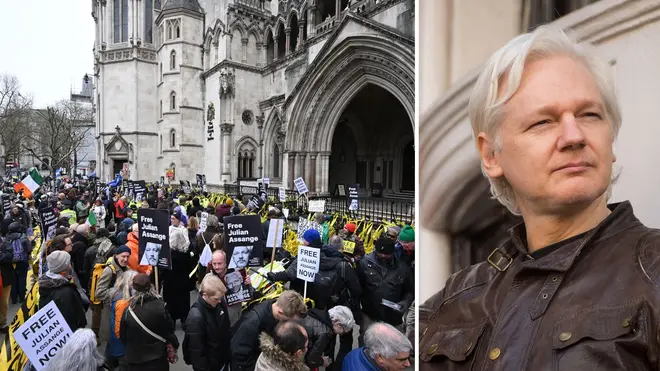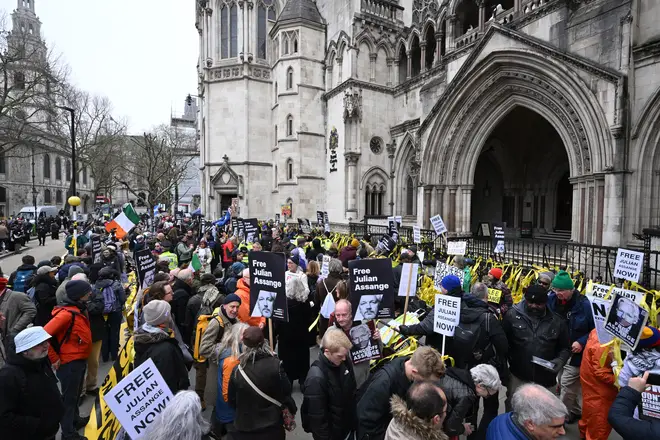
James O'Brien 10am - 1pm
20 February 2024, 12:47

Julian Assange is at risk of being the subject of a "flagrant denial of justice" if extradited to the US, the High Court heard today.
Wikileaks founder Assange, who is not appearing in court because of illness, has been in a UK prison since 2019 and is wanted by the US for disclosing secret military files in 2010 and 2011.
In 2021, the UK High Court ruled that he should be extradited, dismissing claims that his poor mental health meant he might take his own life in a US jail.
At the start of the hearing, two judges were told that Assange is being prosecuted for an "ordinary journalistic practice".

Edward Fitzgerald KC, for Assange, said: "He is being prosecuted for engaging in ordinary journalistic practice of obtaining and publishing classified information, information that is both true and of obvious and important public interest."
The barrister said at the outset of the hearing that the Wikileaks founder is not attending the hearing as he is unwell.
The court heard there is a “real risk“ that Assange will suffer “a flagrant denial of justice” if he is extradited to the US.
Lawyers for Assange asked for the green light to appeal against then-home secretary Priti Patel's decision to approve his extradition in June 2022.
In written submissions, Mr Fitzgerald said that under the Extradition Act, Ms Patel had the power to refuse to approve the extradition.
He said: "It is respectfully submitted that it is, at lowest, arguable that the act does not operate in this manner, and specifically does not preclude the secretary of state from halting an extradition which is patently prohibited by the treaty."
He continued: "It is a stark proposition, unsupported by authority, that the secretary of state is bound by law to give effect to an extradition request which she knows to be prohibited by international law."
Protesters gathered outside the Royal Courts of Justice early this morning.
Hundreds of golden ribbons with the words "Free Julian Assange now!" were tied to the main fence and the surrounding gates and trees.
Protesters were waving Australian flags, holding placards with the words "Free Julian Assange" and "drop the charges", and chanting "there is only one decision - no extradition" and "US, UK, hands off Assange".
A speaker on a stage outside the Royal Courts of Justice welcomed protesters to the "most important freedom of speech case in the 21st century".
He was greeted with cheers and claps from the crowd of protesters.
Tim Dawson, deputy general secretary at the International Federation of Journalists, then took to the stage.
He said: "Be under no illusions, if this prosecution is successful, other vital cases will never come to light."
"Free Julian Assange, support journalism and safeguard free speech," he finished, to claps and cheers from the audience.
The next speaker, Craig Murray, a former British ambassador to Uzbekistan, said if Assange's appeal was not granted, it would be an "attack on the freedom to know, an attack on the rights of every single person here and every single person around the globe".
"I have lost all faith in the independence of the judicial system," Mr Murray said.
Assange is seeking permission to review Priti Patel's decision and challenge the original 2021 High Court ruling.
If this two-day hearing fails, Assange will have exhausted all appeal routes in the UK and will enter the process of extradition.